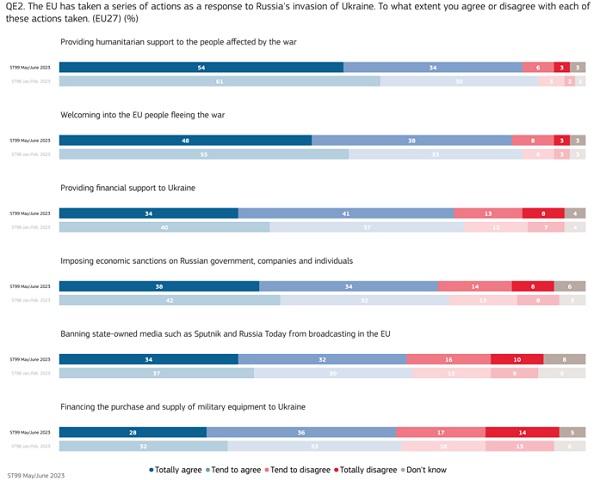 Credit: Standard Eurobarometer 99 - Spring 2023
Credit: Standard Eurobarometer 99 - Spring 2023
The latest Standard Eurobarometer survey, carried out in June and published on Tuesday 11 July 2023, has indicated strong support among Europeans for the European Union's energy policy and its reaction to Russia's invasion of Ukraine.
The survey showed that EU citizens continued to support the energy transition and expected massive investments in renewable energies. They also continued to broadly endorse the measures taken by the EU to support Ukraine and were generally in favour of strengthening EU defence cooperation and increasing defence spending.
Although inflation remained a major concern, the perception of the economic situation and economic forecasts has been improving. Most Europeans believed that NextGenerationEU, the EU's €800 billion recovery plan, could be effective in tackling today's economic challenges. Support for the euro also remained high.
According to Anne Calteux, Representative of the European Commission in Luxembourg, the Eurobarometer is "an important meeting with the European citizen against which the actions of the European Commission are measured". She continued: "This time, it is encouraging to see the extent to which public opinion supports the steps taken to address the energy crisis and the invasion of Ukraine by Russia in particular. The feeling of solidarity seems well anchored among the citizens. This comforts us in the course of action for the home stretch of the Commission's mandate until the European elections in June 2024."
"As so often, respondents in Luxembourg are more favourable than the European average, confirming once again the pro-European attitude of our society," added Anne Calteux.
Regarding the general perception of the EU, 47% of Europeans said they trusted the EU; Luxembourg came in fifth position with 65% of citizens putting their trust in the EU, an increase of eight points compared to the previous edition. Moreover, 45% of EU citizens (62% in Luxembourg) had a positive image of the EU.
This Eurobarometer also confirmed the broad support of EU citizens for the energy transition. 85% of them said they wanted the EU to invest massively in renewables; in Luxembourg, this was the case for 91%. Moreover, 82% of Europeans (88% in Luxembourg) believed that the EU should reduce its dependence on Russian energy sources as soon as possible. The percentage of those wanting the EU to jointly purchase energy from other countries was 80% across the EU and 87% in Luxembourg.
Europeans also appeared to widely endorse the actions taken by the EU in response to Russia's invasion of Ukraine. In Luxembourg, 67% of respondents were in favour of the EU's response. At European level, 88% of those questioned (and 98% in Luxembourg) supported humanitarian action for people affected by the war and 86% (94% in Luxembourg) supported the reception of people fleeing war in the EU. 75% (82% in Luxembourg) said they were in favour of financial support for Ukraine and 72% (75% in Luxembourg) endorsed economic sanctions against Russia. At European level, 64% of respondents (70% in Luxembourg) approved of EU funding for the purchase and delivery of military equipment to Ukraine.
On the subject of defence and security, 77% of EU citizens (92% in Luxembourg) were in favour of a common defence and security policy and the majority favoured better coordination of military equipment purchases (77%), a strengthening of the EU's capacity to produce military equipment (69%) and an increase in the defence budget in the EU (66%).
Moreover, the rate of people believing that the situation of the European economy was good increased by five points since January/February to 45% (58% in Luxembourg). The perception of the economic situation in Luxembourg was particularly good: the Grand Duchy ranked second (with 87%) after Denmark (90%) and was well above the European average (40%).
The euro witnessed an almost record level of support (78% in the eurozone, 71% in the EU as a whole and 87% in Luxembourg). With 56%, Luxembourg was close to the EU average of 55% who believed that the NextGenerationEU recovery plan could be effective in responding to current economic challenges.
At European level, rising prices, inflation and the cost of living were perceived as the biggest problems, although to a lesser extent than at the start of the year (27%, down 5%). Other subjects of concern were the international situation (25%, down 3%) and immigration (24%, up 7%). For Luxembourg residents, inflation and the cost of living were the main concerns (for 39% of those questioned), followed by climate change (26%), the international situation (22%) and immigration (18%).
More detailed results from the "Standard Eurobarometer 99 - Spring 2023" are available at https://europa.eu/eurobarometer/surveys/detail/3052.








